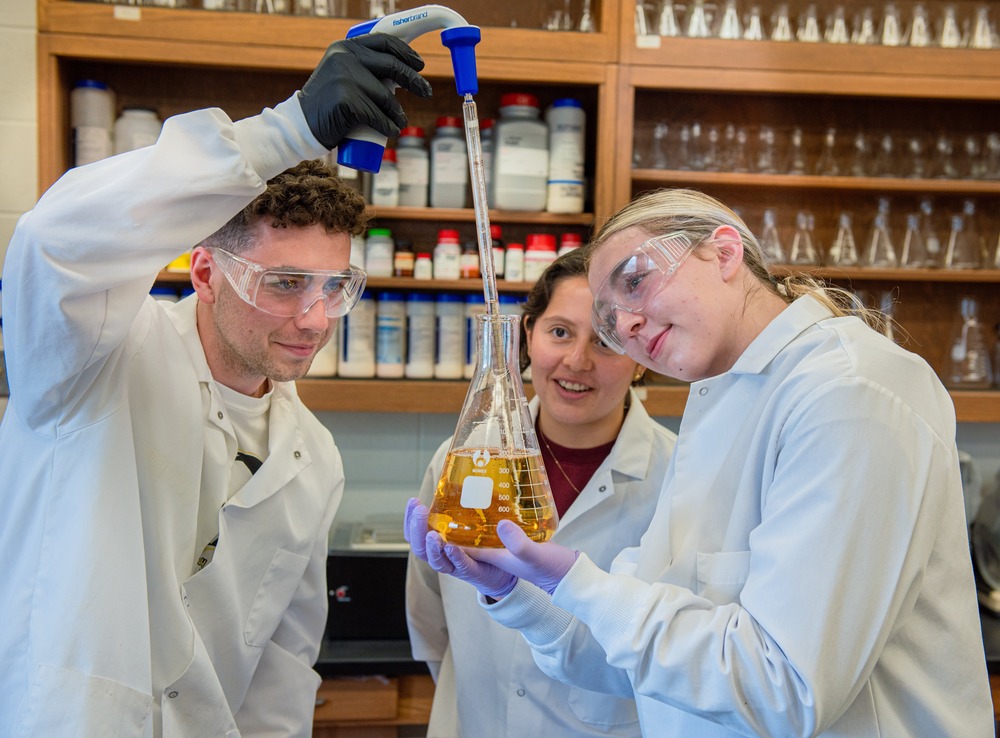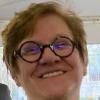
SURVE students Ethan Emineth, Grace Dahl, and Mariapocs Ruiz Martinez, are pictured working in the lab at University of Mary in Bismarck, N.D., June 18, 2024. Mariapocs "Maria" is demonstrating how media is removed from a culture flask so that the number of cells in the culture can be measured. She is using aseptic technique in the presence of a Bunsen burner so that the culture media does not become contaminated. (OSV News/Mike McCleary, courtesy University of Mary)
They're among the tiniest of God's creatures — fruit flies.
While many think of them as a particularly pesky annoyance, for David Ronderos — a biology professor at the University of Mary in Bismarck, North Dakota — and his aspiring scientist students, the miniature insects just may hold the clues to unlocking the genetic causes of human blindness.
Ronderos directs University of Mary's Summer Undergraduate Research Vocation Experience, or SURVE, a 10-week annual program from late May through early August providing paid, science-research internships. Students — many of whom are exploring careers in science — conduct hands-on, faculty-mentored research, design and perform experiments, analyze and interpret data, and present their results.
The SURVE acronym isn't accidental, either.
"Embedded in the acronym is the idea that you're meant to give yourself away in love to others," Ronderos told OSV News, "as part of your Christian calling in life."
Daily prayer, community meals, reading and discussion, seminars, and the opportunity to attend daily Mass are integrated with lab work, to fuel both professional and spiritual growth.
Intentionally designed to promote "science as a vocation" — with a nod to University of Mary's Benedictine tradition — SURVE began in 2017 with just two faculty, but has since expanded to four faculty and 15 participants.
Previous SURVE research has focused on drugs to treat AIDS, DNA repair mechanisms, computer modeling of molecular dynamics, cancer and more.
And now, the humble fruit fly — formally known as drosophila melanogaster — and the complexities of human blindness is SURVE's focus.
"Drosophila — the fruit fly — is one of the major model organisms that's used for research," explained Ronderos. "There's a very large community that does research on drosophila, so there's a lot of community sharing of tools."
Anyone who's seen an electron microscope photo of a fly eye — with hundreds of apparent circular structures dotting its surface, known as a "compound pattern" — might wonder how it's related to a human eye.
"Even though the insect compound eye may look very different from our own eyes, at the cellular and molecular level, it's very, very similar — so that much of the discoveries that we make in our drosophila will also be directly related to human vision," Ronderos noted. "The discoveries that we make in how fly eyes work — or don't work — can help lead to treatments for genetic diseases affecting humans, and the human visual system."
Advertisement
How do they do it?
"We break genes in the fly, and record from their eyes to see if the flies go blind," said Ronderos. "And we can put the genes back into the fly to rescue and restore their vision."
Foundational to SURVE is a non-negotiable program premise: the teaching of the Catholic Church that science and reason aren't automatically at odds with faith and religion.
As the Catechism of the Catholic Church observes, "There can never be any real discrepancy between faith and reason. Since the same God who reveals mysteries and infuses faith has bestowed the light of reason on the human mind, God cannot deny himself, nor can truth ever contradict truth."
The catechism then adds a critical framework for scientific inquiry: "Consequently, methodical research in all branches of knowledge, provided it is carried out in a truly scientific manner and does not override moral laws, can never conflict with the faith, because the things of the world and the things of faith derive from the same God."
"We have the great gift of our faith to help guide us in this area," Ronderos emphasized. "And the church has been very clear that there cannot be an actual contradiction between faith and reason. That's one principle that we can be very confident in — there cannot be an actual conflict between faith and science."
As St. John Paul II famously stated in the opening of his 1998 encyclical "Fides et Ratio" (On the Relationship Between Faith and Reason), "Faith and reason are like two wings on which the human spirit rises to the contemplation of truth."
In a message a decade earlier — on the occasion of the tricentennial of Isaac Newton's "Principia Mathematica," a text expounding the basic laws of physics — the pontiff also observed, "Science can purify religion from error and superstition; religion can purify science from idolatry and false absolutes. Each can draw the other into a wider world, a world in which both can flourish."
The SURVE program aims to graduate scientists capable of striking exactly that precise balance between disciplines.
"We want well-formed scientists who can be servant leaders with moral courage and an ethical framework — who can go out and do great things, and help be sort of that leaven in society in these areas of science and basic research in the biomedical fields," Ronderos stressed. "I think this can be the difference between merely intending good, and actually doing good."
Ronderos' students emphatically agree.
"I would love to be able to show other people that it is possible to combine these really diversified fields in our modern culture and society," said Ian Dorval, 19 — a Catholic and chemistry major who will graduate in 2027 — "that science and faith aren't meant to combat each other, but to perfect each other, and bring each other to fullness in a real concrete way."
Maragret Talafuse, 18 — a Catholic pre-med and psychology major who will also graduate in 2027 — said she felt "one of the crises that Catholics have is, are we able to accept something both from the standpoint of faith and from the standpoint of reason?"
The SURVE program, she noted, doesn't make students choose. "You don't need to just have just faith or just reason — it is so possible to synthesize them," Talafuse added, "and to do it in such a way that you maintain the truth and integrity of what is being talked about."
It's clear Ronderos is proud of the efforts of those he mentors — and that he hopes their work will inspire other student scientists to take the same educational path.
"Science is one of those areas that has a very large impact on all of our lives," Ronderos reflected, "and it's an area in which we need Catholic laity to step up."







